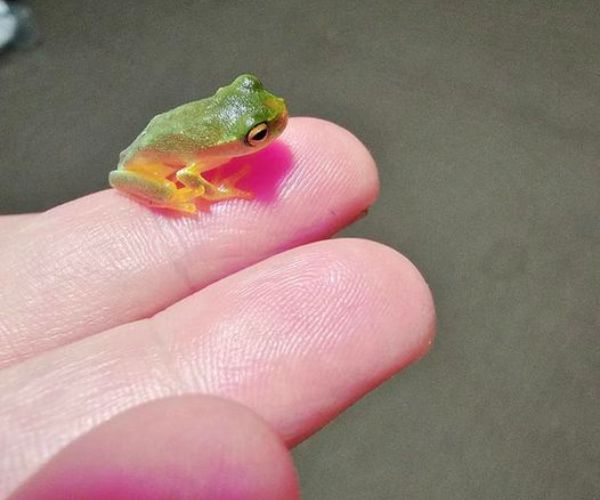Baby tree frogs are becoming much more popular as pets lately. You can have a good leisure time with these tiny creatures. But of course, you should learn about their diet before bringing them as your net pets. The diet of the adult and baby tree frogs slightly differ.
Baby tree frogs like to eat flies, ants, moths, silkworms, earthworks, cricket, and other insects that are not bigger than them. Though adult tree frogs are pure insectivores, baby tree frogs sometimes consume algae and other aquatic plants.
There are more than 700 different species of tree frogs, but their diet is almost similar. It is also highly influenced by their surroundings. Let’s see what you should feed and what should not be fed to your baby tree frogs.

A Good Diet for Your Baby Tree Frogs
As mentioned earlier, the diet of tree frogs largely depends on their surroundings. They can adapt to the change in the environment. Since you won’t be able to imitate their natural diet completely, you should at least try to maintain a variety in their diet.
Most of the species of tree frogs eat worms, larvae, insects, and other small-sized invertebrates. There are no specific insects that they are attracted to. It depends on the availability of the place they live in.
When the tree frogs are little grown, they can also consume small animals. It includes spiders, snails, fish, snakes, lizards, and sometimes it can be other frogs. Cricket is also very popular among tadpoles.
Based on their natural eating habit, you should provide them with different foods such as:
- Terrestrial insects like ants, beetles
- Flying insects, including cricket, flies, and moths
- Plankton and algae
- Different kinds of worms. It can be earthworms, silkworms, etc.
- Sometimes smaller frogs for rare species
You should keep in mind that these frogs need to consume different kinds of foods for a healthy life. Make sure you are not feeding baby tree frogs a similar kind of food all the time. Keep variations. Plankton and algae can sometimes be given for a change; it should not be their main food item.
Some studies show that ants comprise 40% of baby tree frogs’ diet, while beetles contribute 30%. So, you can see that maintaining a good diet for tadpoles is not going to be so difficult.
How to Feed Your Baby Tree Frogs
Providing enough food sometimes is not enough. You have to maintain some rules so that the frogs can have them. Here is your step-by-step guide on how you can feed them properly.
- First of all, you should treat your frog-like frog. They are not like dogs or cats and so do not like to be hand fed. Feeding frogs with your hand is not a good idea. So, avoid hand-feeding your baby tree frogs.
- Keep them in a spacious tank. It will make them comfortable for both living and eating.
- You can make cricket the primary food item for your baby tree frogs as they are easier to supply.
- Keep a variation in their diet. Offer them sometimes terrestrial insects, other flying insects, and sometimes aquatic plants.
- Add powdered vitamin and calcium supplements to your frog’s food to ensure they are getting all the necessary nutrients.
- Offer them live insects instead of dead ones. Frogs, by nature, like to prey. Therefore, live insects are accepted as food sooner than dead ones.
- You can occasionally feed them frozen fish. But make sure the fish is on the list of their natural diet.
- You must feed your baby tree frogs every day. They do not consume a lot of food at once and should be fed daily. It is required for their growth and healthy life.
How Do Frogs Hunt for Prey?
Frogs are hunters. Whether they are living freely in the wild or you are keeping them as pets in tanks. They like to hunt for food. That is why it is suggested to provide them with living insects. But how are they going to hunt down their prey?
The tongue is the primary weapon for hunting for tree frogs. The tongue is basically the primary weapon of hunting for any frog species. They can move it really fast. Some studies show that they can move this organ at a speed of four meters per second!
Additionally, their tongue saliva works both as liquid and solid. It also has superb adhesion characteristics. And tree frogs also have a strong pair of eyes. They can see at night as well, and it is one of the primary reasons for them being nocturnal.
Frogs have forward-facing eyes. It makes their vision narrower. Nonetheless, they have adapted to the narrow sides and used it to their advantage. They can closely measure the movement of their prey before striking.
As most frogs cannot chew, they intend to prey on smaller insects than themselves so that they can swallow them whole. You should add mult-layers in their tank as it will make it easier and more comfortable for them to hunt prey.
What Not to Feed Your Baby Tree Frogs
While adding necessary nutrients is important, avoiding harmful food items is important too. There are some foods that should not be included in the diet of your baby tree frogs, such as
Chlorinated water
Water is an essential element for baby tree frogs’ survival. You must maintain a 50-60% humidity level in the tank of the frogs. However, make sure the water is dechlorinated. Chlorine is not good for their health. It can make them ill. Therefore, it is also advised not to provide your tree frogs with tap water.
High Protein Foods
Most of the tree frogs are insectivores. They sometimes eat aquatic plants before they are fully grown-ups. However, you should not feed them lean meats like beef, lamb, turkey, or other high-protein foods. You should also prevent yourself from feeding rodents. Frogs’ digestive systems do not work properly for these foods, and feeding them such foods can also cause kidney cancers for them.
Fruits
How many times have you heard, “An apple a day keeps the doctor away?” Well, fruits are good for your health, but not for frogs. Tree frogs or any other frogs cannot eat fruits as they are carnivores. Fruits usually contain a high level of fructose, which is not suitable for their digestive system. Therefore, avoid adding any kind of fruit to their diet.
Same Food Everyday
You should not provide the same food every day to your frogs. Sticking to one food item will result in the complete absence of some necessary nutrients. As a result, your frogs will become weak and ill.
FAQs
1. Can I feed tree frogs bananas?
No, you should not give bananas to tree frogs. Their digestive system is not suitable for any kind of fruit because of the presence of fructose. They are carnivores, and fruits are not in their natural diet.
2. Can I feed vegetables to tree frogs?
Frogs are carnivores and cannot consume or digest vegetables. Therefore, you should not feed them any vegetables as it can cause complications to their health. However, some baby tree frogs eat a small amount of aquatic plants.
3. Is poultry food good for tree frogs?
Any kind of poultry food is avoidable for tree frogs. They are insectivores and cannot digest meats with high protein, such as chicken, duck, or turkey. Feeding such meat can cause serious illness, including kidney damage.
4. Can baby tree frogs hunt?
Yes, baby tree frogs can also hunt their food themselves. They are not required to feed upon. They hunt flies and cricket of smaller sizes. They use their tongue for hunting. Also, their sticky pads help them in action.
Conclusion
Tree frogs are not very demanding when it comes to eating habits. All you need to do is provide them with a variety of foods regularly. They are nocturnal insectivores and can consume different types of insects. However, they should not be fed fruits, vegetables, and minced meats. Thus, you can keep your tree frogs healthy and active.

Leave a Reply